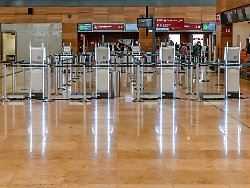Friday February 12th 2021
Coalition agree
The federal government only wants to help larger airports
Not much is going on at Germany's airports during the pandemic. They have opened anyway and sometimes have considerable shortfalls. The federal government is now launching an aid package. Smaller regional airports, however, fall through the cracks.
When it comes to Corona aid for German airports, the federal government wants to concentrate on the 15 larger airports. The almost equally large number of smaller regional airports, on the other hand, should not be supported directly, but only relieved of air traffic control fees. This emerges from a compromise paper that the line ministries and government groups have agreed on.
In addition to the payments of around 400 million euros to the three airports with federal participation (Berlin, Munich, Cologne-Bonn), the federal government plans to provide 200 million euros in non-repayable grants to help twelve larger airports of high importance in terms of transport policy, which it does not own. According to a paper from coalition circles, these are the airports of Bremen, Dresden, Düsseldorf, Erfurt, Frankfurt, Hamburg, Hanover, Leipzig, Münster / Osnabrück, Nuremberg, Saarbrücken and Stuttgart.
Specifically, it is about the reimbursement of costs for keeping airports open at the beginning of the corona pandemic. The prerequisites for federal support are therefore that the respective federal states make a grant of the same amount, no dividends are distributed for 2020 and no bonuses are paid to managing directors and board members of the operating companies. The federal states had previously declared their general readiness for a 50-50 model proposed by Federal Transport Minister Andreas Scheuer. The overall package is worth well over a billion euros.
ADV urges you to pay out quickly
The international airports of Dortmund, Paderborn, Weeze, Friedrichshafen, Hahn and Karlsruhe-Baden-Baden would have to do without direct federal funding. Regional airports such as Memmingen, Kassel, Lübeck or Rostock would also go away empty-handed. The package stipulates that the federal government will cover the costs of air navigation services that it already pays for the 15 larger ones. So far, the small airports have borne these costs themselves and cannot always pass them on to the airlines.
In the 2021 federal budget, 20 million euros have already been earmarked for this support measure, which may now be consolidated. In addition, the federally owned Deutsche Flugsicherung GmbH will receive equity support of 300 million euros this year. The industry association ADV recently described the dramatic economic situation at all airports after the collapse in traffic and demanded support for the entire system. According to the association, every fourth of the approximately 180,000 direct jobs at the airports is threatened.
ADV managing director Ralph Beisel described the compensation payments that have now been decided as an "important and long overdue course for Germany as a business location". The aid should be paid out quickly. Beisel warned not to forget the smaller airport locations. They are at a competitive disadvantage in assuming sovereign costs. The federal government remains challenged here.
The vice-chairman of the Union parliamentary group, Ulrich Lange, spoke of a "quick, one-time and balanced subsidy solution" for airports with federal interests in terms of transport policy. This could offset the costs that were incurred while maintaining airport operations in the first lockdown. "Although it is not obliged to do so, the federal government exceptionally supports the important commercial airports and thus Germany as an aviation location."
. (tagsToTranslate) Economy (t) Berlin Brandenburg Airport – BER (t) Munich Airport (t) State aid (t) Corona crisis
